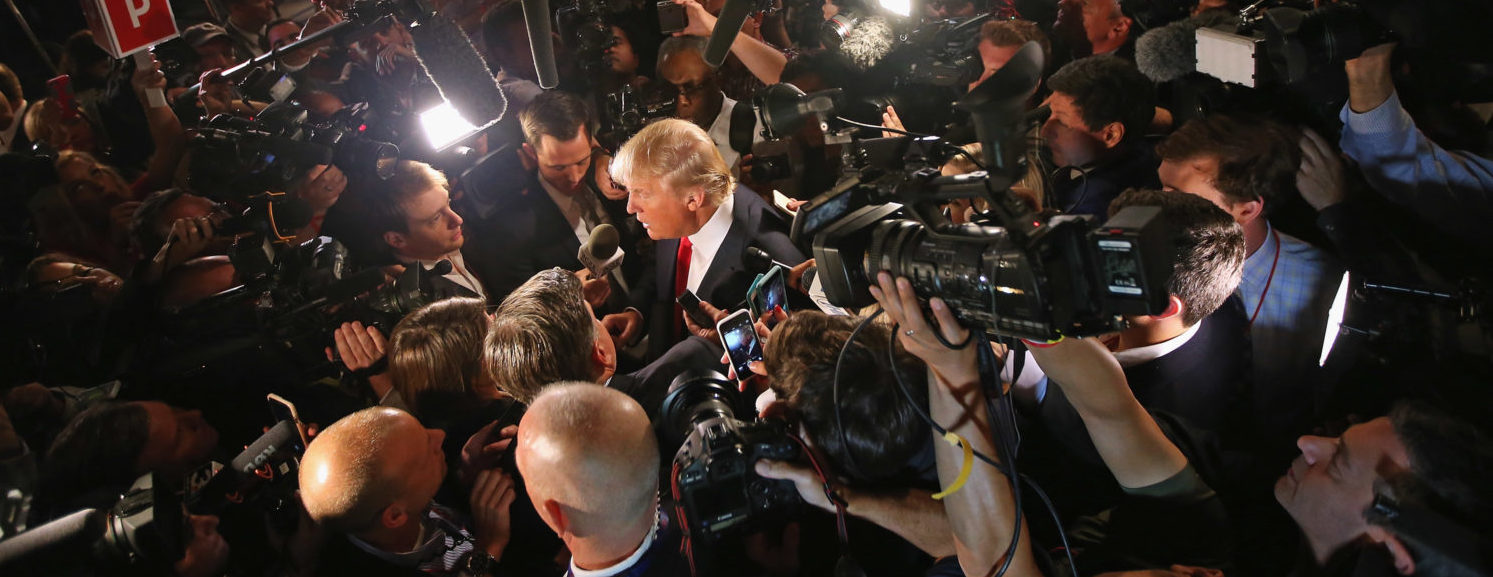Sign up for The Media Today, CJR’s daily newsletter.
To hear journalists tell it, the 84 days since President Donald Trump’s inauguration have exposed us to a fifth dimension beyond that which is known to man. Self-contained storylines that once would have risen and fallen in distinct waves of public attention have given way to information overload and frequent confusion. Time seemingly blurs as new developments flash like strobe lights from all angles. The traditional news cycle has been killed, and I suggest the culprit was Trump, in the White House, with the lead pipe.
Remember “alternative facts”? It was just Day 3. The news-time continuum still had a semblance of balance then, even if the underlying factors priming it for carnage had already been set: a sensationalist media with an insatiable appetite for content; massive distrust of the mainstream press; a fragmented social web that incentivizes false information; and a political U-turn in Washington. With his predilection for impulsive action and self-contradiction, the tweeter-in-chief was uniquely suited to overload an already strained system.
The question we’re left with, posed time and again by journalists on Twitter, in stories, and on podcasts that double as support groups for media whiplash, is whether the public can cope. And consensus speculation is that mere mortals can’t possibly keep up.
https://twitter.com/CillizzaCNN/status/850007765212942337
https://twitter.com/KFILE/status/847607862385754112
https://twitter.com/fmanjoo/status/850484155938816000
Me trying to catch up on all the politics news out of D.C. this morning pic.twitter.com/RyJcwq5mfL
— Liam Stack (@liamstack) April 6, 2017
Enterprising news organizations craving new products have not let this potential crisis of public attention go to waste. The Guardian’s daily CliffsNotes for political news, the self-explanatory “Minute,” was rolled out with some foresight last year. NBC News has been boiling down each of the Trump administration’s first 100 days to a single key moment. Politico has expanded its early morning Playbook newsletter with a midday “Power Lunch” edition. Should the speed and discombobulation of news continue to accelerate, the franchise may need to detach itself from human eating schedules and align more with that of hobbits: Breakfast Playbook, Second Breakfast Playbook, Elevenses Playbook, and so on.
A new entrant that displays perhaps the most accurate encapsulation of this peculiar moment takes the form of an independent email blast: “What The Fuck Just Happened Today?” The aptly named roundup does the yeoman’s work of “logging the daily shock and awe in politics.”
An abridged recap of the greatest news hits of the not-yet-three-month-old Trump administration—policy changes, palace intrigue, military escalation—would read with encyclopedic density. Trump’s tweeting and frequent clashes with the media provide a running backdrop, as does the ever-more-complicated inquiry into Russian meddling in last year’s election. That latter storyline has reached its umpteenth level of complexity, even if we still can’t agree on how to pronounce House Intelligence Committee Chair Devin Nunes’s last name.
The president and his retinue, meanwhile, empower the likes of Fox & Friends, conspiratorial blog Gateway Pundit, and alt-right icon Mike Cernovich. Fake news has become an overused and increasingly meaningless insult on all sides of the debate. “We are entering a space of total metaphysical and informational confusion,” Ezra Klein summarized on a February episode of Vox’s policy podcast, The Weeds.
The meta-coverage of this phenomenon has tended to focus on how keeping up with the news may induce stress—some pieces pose solutions—and the head of the American Psychological Association even called the potential effects “deeply concerning.” But what about news comprehension, ostensibly the first goal of journalism?
A Huffington Post/YouGov poll released this week suggests that worries about information overload may be overstated—or at least more complicated than was previously assumed. Just 30 percent of respondents who try to follow current events “say that they feel political news is changing so quickly that they can’t keep up,” according to the survey of 1,000 American adults. Sixty percent say it’s not a problem, and about two-thirds of all respondents add that following political news now is either just as manageable or even easier than in years past. Older and more Trump-supportive respondents were more likely to say they could cope.
Of course, surveys also occasionally suggest that Americans may not be as well-versed in current events as they think. Yet there seem to be a few possibilities for the disconnect on the public’s perceived ability to keep up. The Huffington Post’s primary caveat is that respondents might, in fact, be overwhelmed by the news but say the opposite when polled. The rosier take is that media organizations have risen to the occasion more than they themselves understand.
More plausible is that media professionals, academics, and the political class comprise an informational elite that live in a media universe distinct from that of a large portion of the public. They have the interest, energy, and toolkit to navigate the full scope of political information zooming around the internet. Many others tend to stick to familiar sources of their choosing, popping in and out of news depending on the story or day. During a time of intense discussion of the media’s disconnect from the public—by ideology, geography, or formal education—it would add yet another fault line to the mix.
What’s clear is that the digital hamster wheel that journalists inhabit will only continue its acceleration. Less so is whether the rest of the public, bereft of the news cycles that act as a sort of on-ramp by focusing attention, will be able to get back on track.
Has America ever needed a media defender more than now? Help us by joining CJR today.



